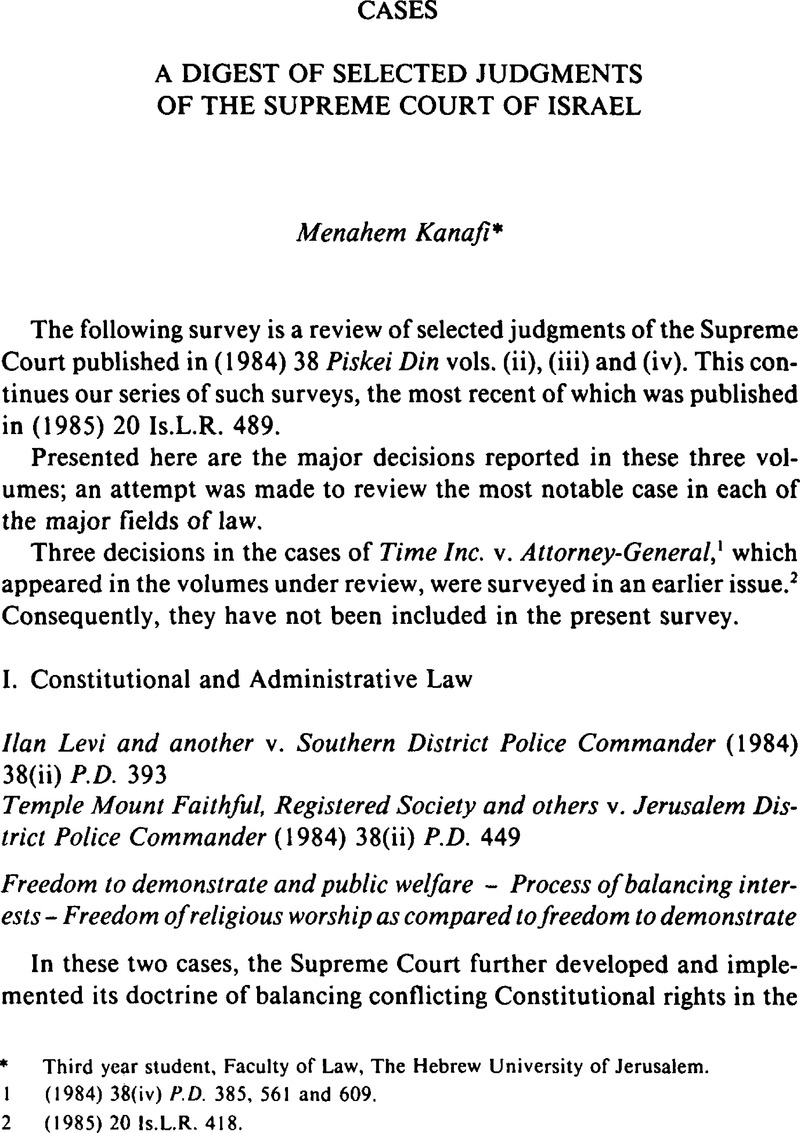No CrossRef data available.
Article contents
A Digest of Selected Judgments of the Supreme Court of Israel
Published online by Cambridge University Press: 16 February 2016
Abstract

- Type
- Cases
- Information
- Copyright
- Copyright © Cambridge University Press and The Faculty of Law, The Hebrew University of Jerusalem 1987
References
1 (1984) 38(iv) P.D. 385, 561 and 609.
2 (1985) 20 Is.L.R. 418Google Scholar.
3 See, for example, H. Cohn J. in Yeredor v. Chairman of Elections Committee (1965) 19(iii) P.D. 365.
4 Kol Ha'Am and another v. Minister of the Interior (1953) 7 P.D. 871, at 891.
5 Disenchik v. Attorney-General (1963) 17 P.D. 169, at 171.
6 See also Sa'ar v. Minister of Police (1980) 34(ii) P.D. 169. See generally Kretzmer, D., “Demonstrations and the Law” (1984) 19 Is.L.R. 47Google Scholar.
7 Many precedents were cited in Barak J.'s opinion on this point, the most recent of which was Y. Kanty v. G. Kanty (1980) 34(iv) P.D. 633.
8 The first formulation of this rule as binding precedent is found in A. Almog v. R. Almog (1973) 27(i) P.D. 582, at 587.
9 21 L.S.I. 41. at 47.
10 K.T. (1971) no. 2692, p. 943.
11 19 L.S.I. 246.
12 27 L.S.I. 117, at 123.
14 26 L.S.I. 204, at 213 which states:
33. (a) Where a person occupies any property as the owner or long-term lessee or one of the owners or long-term lessees, and his right in the property terminates in consequence of the sale thereof in the execution of a judgment or the realisation of a mortgage or in bankruptcy or in consequence of the partition thereof in partition or land settlement proceedings or by registration in the Register of Cooperative Houses under section 42 of the Land Law, 5729–1969, the occupier shall become the tenant of the new owner or long-term lessee.
15 Supra n. 12.
16 (1966) 20(i) P.D. 126.
17 See, e.g., The Jerusalem Industrial Company Ltd. v. Agyon and another (1952) 6 P.D. 887, at 889.
18 Supra n. 12.
19 Penal Law, 1977, L.S.I. Special Volume, p. 56:
181. Where the husband dissolves the marriage against the will of the wife, and there is not, at the time of the dissolution, a final judgment of the (civil) court or of the competent religious court making the dissolution binding on the wife, the husband shall be liable to imprisonment for five years.
20 2 L.S.I. [N.V.] 5, at 20:
Breach of statutory duty.
63. (a) Breach of a statutory duty consists of the failure by any person to perform a duty imposed upon him by any enactment other than this Ordinance, being an enactment which, on a proper construction thereof, was intended to be for the benefit or protection of any other person, whereby such other person suffers damage of a kind or nature contemplated by such enactment: Provided that such other person shall not be entitled by reason of such failure to any remedy specified in this Ordinance if, on a proper construction of such enactment, the intention thereof was to exclude such remedy.
(b) For the purposes of this section, an enactment shall be deemed to be for the benefit or protection of any person if it is an enactment which, on a proper construction thereof, is intended for the benefit or protection of that person or of persons generally, or of any class or description of persons to which that person belongs.
21 (1983) 37(i) P.D. 113, surveyed in (1984) 19 Is.L.R. 523, at 567Google Scholar.
22 5 L.S.I. 171.The legislative history referred to is found in H.H. (1951) no. 75, p. 190.
23 K.T. (1983) no. 4492, p. 1281.
24 1 L.S.I. [N.V.] 145, at 204.
25 (1983) 37(iii) P.D. 1.
26 Penal Law, 1977, L.S.I. Special Volume, p. 73:
257. A person who, being in lawful custody for a criminal offence, escapes from such custody –
(1) if he is charged with or has been convicted of a felony – is liable to imprisonment for seven years;
(2) in any other case – is liable to imprisonment for three years.
27 Suissa v. State of Israel (1983) 37(i) P.D. 477, surveyed in (1984) 19 Is.L.R. 523, at 585Google Scholar.
28 (1981) 35(iv) P.D. 421.
29 Penal Law, 1977, L.S.I. Special Volume, p. 24.
30 Ibid., at 109.
31 (1971) 25(i) P.D. 589.
32 Kadosh v. State of Israel (1982) 36(iii) P.D. 225.
33 (1959) 13 P.D. 1205.


